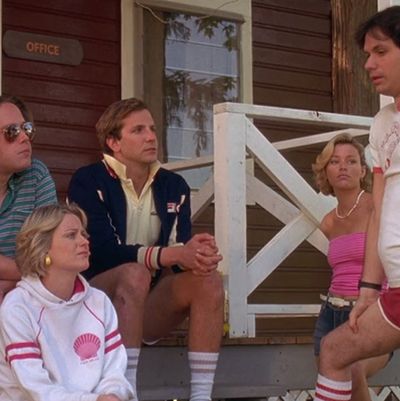
If I’d listened to the guy at Blockbuster, I might never have seen Wet Hot American Summer at such a pivotal time.
“Don’t get this,” the Blockbuster guy said when I brought the DVD to the register. “You’ll regret it.”
In all my years of Blockbuster-ing I had never been told that I’d “regret” a rental, not even Under Siege 2: Dark Territory or Rob Schneider’s The Animal. I asked him why he hated it so much.
“Because it’s dumb as hell and it makes no sense,” he clarified.
I rented it anyway. And then I took it to my friend’s house where we proceeded to laugh harder than we’d ever laughed before, all the while wondering: What were we seeing that this other guy didn’t? And: Why wasn’t this a thing that everyone was talking about?
Looking back on the initial reviews of the film — and they are famously, almost unanimously vicious — critics clearly shared the Blockbuster guy’s opinion, focusing on Wet Hot as some sort of gleefully misguided genre parody. Even the most positive of the bunch, Owen Glieberman’s review in Entertainment Weekly, called it an “ingenious pop satire” of 1980s teen comedies. But this isn’t how I’d describe Wet Hot to anyone, nor would any other fan I know. Sure, it’s based in the ‘80s world of overstuffed workout montages and tight striped shirts and short shorts, but by god if it wasn’t so much more than a parody, so much more than a satire. Wet Hot created a tone and a world all its own.
Yes, it was dumb and absurd — so profoundly, beautifully dumb and absurd! — but it didn’t feel dumb in a way I’d seen before. It was dumb-smart, its dumbness freshly imbued with a deep, winking self-awareness. And even while its characters followed no logical trajectory, it maintained a big, open heart, which became more and more evident upon repeated viewings. The movie made us legitimately care, for example, about Gene, a Vietnam vet who humps fridges and confides in a can of beans, even though there was no realistic reason for us to do so. And it invested real love in an actual gay relationship — with an actual sex scene, no less! — which I can safely say no other comedy was doing in 2001. It was this blend of cynicism and sweetness that also happened to reflect the cultural moment when Wet Hot was released — around the turn of the millennium, at the midpoint between Gen X irony and Gen Y earnestness.
Christopher Meloni, who played Gene, told me in an interview that he thought of David Wain, Michael Showalter, & Co.’s style as a comedy “jazz riff,” and that’s certainly apt. Wet Hot always knew what you were expecting, then tended to go the opposite way. See: Coop and Katie’s final moment together, or the counselors’ progressive response to catching McKinley and Ben together — at once commenting on a genre cliché then undercutting it with something more ridiculous, like a massive gust of wind at the climax of a talent show. You also couldn’t explain why Wet Hot was funny, which gave its admirers an “exclusive club” feel. Try telling a friend about your favorite scenes, and you sounded like a lunatic. “That part when everybody stands in front of a wall!” “In the barn where they switch shirts over and over!” “Paul Rudd picks up cutlery for two whole minutes!”
After their TV series, The State, ended in 1995, Wain, Showalter, and Michael Ian Black quietly doubled down on their brand of humor with their comedy trio, called Stella, which led them to perfect their incredibly specific tone. (Quick note: If you are a fan of Wet Hot and still haven’t watched the Stella shorts, recorded from 1998 to 2002, please enjoy.) Wet Hot, however, was the first time it really entered a more mainstream arena. And when something new and exciting is presented to the public, it’s often faced with scorn (see: Alien, The Shining, Jesus) — that’s what makes it spark and catch on. In the years since Wet Hot’s release we’ve seen various forms of “alt-comedy” become part of the mainstream and watched many of the film’s stars become gargantuan celebrities. Subsequent releases, meanwhile, have certainly felt like Wet Hot cousins — the Anchormans come to mind, as do Will Ferrell’s Casa de Mi Padre or IFC’s recent Spoils of Babylon series. You could argue that Arrested Development was born from that universe, too, although their plotting and structure was far more intricate.
Since the film’s release in 2001, other Wain-Showalter projects have taken their brand of comedy into the world with varying degrees of success, but they’ve all had Wet Hot as the talisman in their rearview mirror, which is why it’s so relieving to see them return to form with as much joy as the last time. Wet Hot American Summer: First Day of Camp, an eight-part “prequel” that premieres on Netflix today, takes the film’s torch and carries it triumphantly into the light.
Nostalgia can create dangerously high and deeply fearful expectations (oh, new Mr. Show episodes, please be good), but this new Wet Hot installment plays like the most glorious reunion. Character backstories are created and blown apart, celeb cameos are constant and ridiculous, and story lines are twisted and shifted at the drop of a hat. “Plot,” as I mentioned, was not exactly the film’s calling card, but the TV show is eight episodes of magnificently overplotted stupidity, and Wet Hot devotees should no doubt be rapt.
The film ushered in a comedy style that still feels untouchable, 15 years later. What’s so funny about a guy mispronouncing the word journal, or the sound of glass breaking over and over, or a complete disregard for continuity? Before Wet Hot, I couldn’t really tell you. Now it seems so clear.

